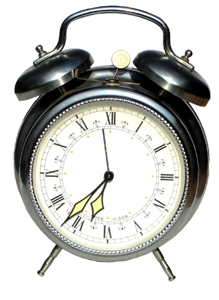Spring Ahead!
- Mar 9, 2023
- 4 min read
Ready to “spring forward” on Sunday, March 12?
Here are 5 tips to help make the impending Daylight Saving Time switch go more smoothly!
For most of us, the clocks change twice a year, “falling” back one hour in early November and “springing” forward one hour in March.
Most of us dislike this twice-yearly time reset. Earlier this year, in the US, the Senate passed legislation to make daylight saving time permanent, perhaps as early as next year. Perhaps that will happen - and maybe Canada will follow!
Even a modest time adjustment can take some getting used to, since our body runs by an internal clock, not a man-made clock, especially when the days feel shorter and darker as cold weather arrives. Even one extra hour of darkness can feel significant to some people who feel low-energy during the low-light seasons of autumn and winter.
Does a Time Reset Affect Our Health?
For most of us, the time change itself doesn’t affect our health. Some people are barely aware of their body’s adjustment and might simply feel a little tired and irritable.
But for other folks, it can be significant. Be respectful and realize that your experience is not the same as others, especially those who may have underlying health issues. See this article referencing studies about increased traffic fatalities, heart attack risk, and depression.
How Long Does It Take for Your Body to Adjust?
Our body’s own time-keeping machine regulates sleep and metabolism. So, a time shift disrupts our sleep and circadian rhythms. It takes circadian and sleep rhythms a little “lag time” to transition. The time change can affect sleeping and waking patterns for 5 to 7 days. So think about one week ahead.
5 Tips to Adjust to Time Changes
Many of these tips are great for any time of the year, but pay special attention to days around the clock change.
Go to bed and get up at the same time. Get at least seven hours of sleep on the day(s) before and after the transition. Lack of sleep tells the body to store fat. While it’s tempting to stay up later or change your habits, it’s best to keep your bed times consistent. The closer you stick to your normal routine, the faster your body will adjust to the time change. If you have a really tough time twice a year when the clocks change, start planning ahead. A few days in advance, gradually adjust sleep and wake times by shifting bedtime 15 to 20 minutes each night. This helps your body make gradual shifts and more slowly adjust.
Practice good habits before bedtime. In the days after the time change, quit caffeinated beverages 4 to 6 hours before bedtime. Avoid alcohol in the evening. If you are exercising, avoid workouts within 4 hours of bedtime because raising your body’s core temperature can make it harder to fall asleep. If you know you have a tough time with time changes, you need to avoid electronics near bedtime, at least for a few days afterwards. Electronics’ high-intensity light hinders melatonin, a hormone that triggers sleepiness. The light stimulates your brain and makes sleep difficult the same way sunlight does. Also, turn off the television and pick up a book. Take a warm–not hot–shower. Dim the lights. Relax.
Keep your dinnertime consistent. Eat more protein, less carbs. On the days around the time change, eat at the same time or even eat a little early. To ease the transition, shift your mealtime forward 15 minutes for a few days in a row. Our sleep cycle and our eating patterns affect each other. Don’t overeat. Also, if you find yourself feeling snacky, eat a snack that is high in protein instead of carbohydrates. (This might seem like good everyday advice, but it’s even more important during time changes.) Try fruit with peanut butter or cheese with crackers. Go shop for fish, nuts, and other sources of protein for dinner this week! Avoid the pasta and carb-loaded snacks!
Get more light! Go outside and get exposure to morning sunlight on the Sunday after the time change to help regulate your internal clock. Having shorter daylight hours affects our mood and energy levels, decreasing serotonin. Make time to take a morning or early afternoon walk outside when the Sun is out. Try using a light therapy box or an alarm light that brightens as you wake up. In the autumn and winter, it’s dark after work. Consider shifting any outdoor exercise to when you can get sunlight; can you get outside for some morning light, even if you need to bundle up?
Take a short nap. Some folks may disagree, but if you’re starting to stack up sleepless hours, it’s safer and healthier for your body to give in to a short nap than to continue without sleep. Make it a short nap (no more than 20 minutes) to restore lost sleep hours; however, do NOT take long naps. It may help to go outside into the natural sunlight to cue your body and help retrain your inner clock.
Farmer's Almanac March 2022






Comments